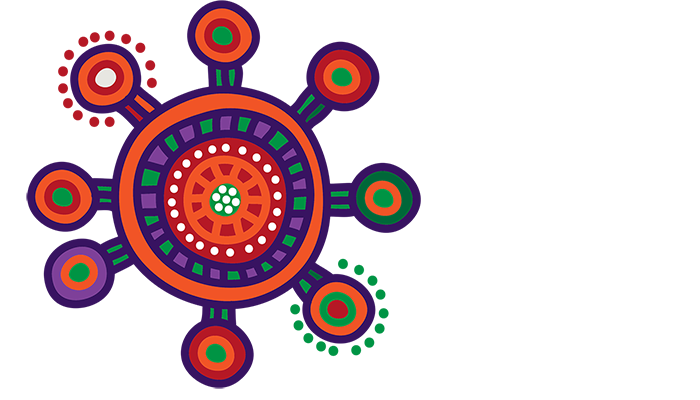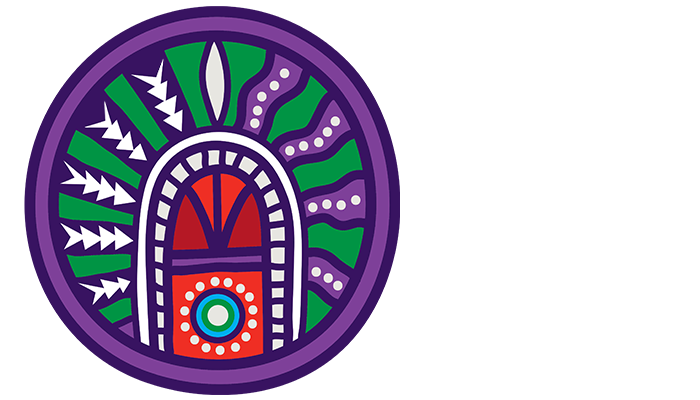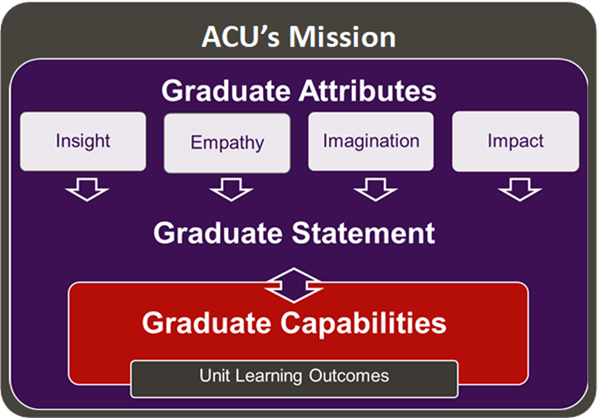This resource provides an overview of ACU's graduate attributes and how they are embedded in the curriculum to support ACU's Mission.
This resource provides an overview of ACU's graduate attributes and how they are embedded in the curriculum to support ACU's Mission.
Overview
On this page
ACU's Graduate Attributes Graduate Statement Graduate CapabilitiesACU's four graduate attributes - insight, empathy, imagination, and impact - express our vision for our graduates, shaping the aspirations we have for all students through their presence in the curriculum, and bringing ACU’s Mission to life.

This symbol represents knowledge of Country across land, sea, sky through navigation by the stars. Pathways lead people throughout Country.
Each graduate has become aware of their own characteristics as a professional, a citizen and a scholar; they are ready to change and grow and prepared for lifelong learning; their experience at ACU has supported them to seek truth and meaning.

This symbol represents the connectedness of Meeting Places (Yarning Circles) and significant ceremonial sites. Empathy becomes inherent when sense of belonging is strengthened through connection to Country, culture and people.
Each graduate has had experience of Indigenous knowledges and can respect and work alongside Australia's First Peoples; they are able to connect with people and cultures, locally and globally; they can integrate knowledge across disciplines.

This symbol reflects the Torres Strait Islander headdress known as the Dhari, it evokes strength in Culture, leadership and inspires the imagination.
Each graduate is encouraged to think creatively and critically to solve problems and see opportunities for innovation; they can discern and build a better future for each person and community.

The symbol for impact is inspired by the Rainforest Shields of Far North Queensland. Used to protect against injury or harm, to stand ground and lead changes.
Each graduate recognises their responsibility to work for social justice and a sustainable world, guided by ethical principles and a commitment to human dignity and the common good; they are ready to respond to and lead changes in their sphere of influence and contribute to their professions and to the community.
ACU's Mission and the graduate attributes aim to develop students who seek the dignity of the human person and the common good. Realisation of ACU's Mission in the curriculum through ACU's graduate attributes is expressed through the graduate statement and graduate capabilities. Staff can consider the students' development through the perspectives provided by the graduate statement and graduate capabilities to reflect on how the Mission is presented through the curriculum.

The ACU graduate statement describes a university level, holistic understanding of the ACU student on completion of their studies. It reflects the aspirational goals ACU has for each student through a consideration of each graduate attribute.
The course graduate statement provides a course-focused description that reflects the attributes students can expect on the completion of their studies. The graduate statement communicates to current and prospective students the aspirational goals ACU has for its graduates. More information and examples of course graduate statements can be found in the CEI Graduate Statement Resource.
Underpinning the course graduate statement are the twelve graduate capabilities which have been developed to evidence the capabilities and skills implicitly and explicitly embedded within ACU’s graduate attributes. Student achievement of the graduate capabilities evidences their capacity to demonstrate the aspirations of the ACU graduate attributes. For more information about how the graduate capabilities are implemented in the curriculum, see the CEI Graduate Capabilities resource.
Visit Service Central to access Corporate Services.